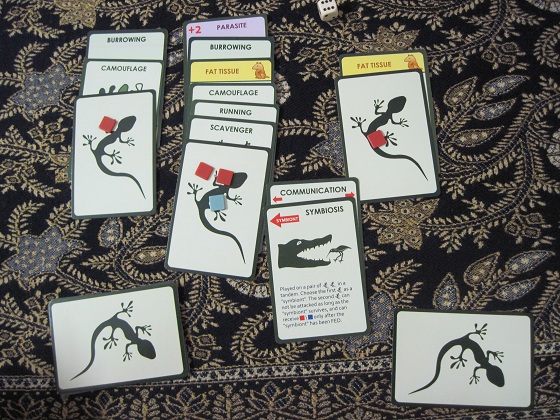
When Hiew brought this little card game out, both Shan and I were struck by how similar it was to Primordial Soup, a game that we’d played a while back with Sean. It shares the exact same theme, down to the evolution of traits to aid survival, the need for food to survive every round and the scoring system that is based on how many of your creatures survive. While Evolution is clearly a light, filler-type game and Primordial Soup is a full game, I ultimately found Evolution to be too simple to be very interesting, especially given how well the older game already covers the same ground. Some notes on the game mechanics:
- In the older game, you’re in charge of an entire species of amoebas, all of which share the same traits. Here, each of your creatures are different, though there are special traits like Symbiosis and Communication that can link pairs of creatures together. Instead of a resource cost for playing trait cards in Primordial Soup, playing cards are essentially free here and you’re limited only by the number of cards you have in your hand. However, some traits do increase the amount of food that your creature needs to eat to survive, thus imposing a cost during the feeding phase.
- Food available each turn is determined by a roll of the dice, so it’s completely unpredictable how much food will be available. Of course, there are many traits to help with food, such Fatty Tissue which allows you to store up extra food for future turns and the ever popular Carnivorous trait which lets you eat other creatures. On the other, opponents can also give your creature the nasty Parasite trait which increases your food requirement by two!
- You can start a new creature any time you wish just by laying a card face-down, unlike Primordial Soup where each new creature costs resources. The real test here is whether or not the new creature has enough to eat and whether or not it can escape being eaten.
- Oddly enough, scoring takes place only at the end of the game. You gain points for both the number of creature you have and the number of traits on those creatures.
My thoughts:
- The abilities are varied enough to have some cool combos, but the relationship between cards are the most part straightforward and hence boring. E.g. camouflage prevents carnivores from eating you, unless it has sharp vision, only swimmers can eat each other and so forth. Nothing like the complex combos that you can achieve in Primordial Soup.
- It’s quite amusing to load up creatures with abilities and imagine how ridiculous the end result must be. And the game does tend to reward going for super-creatures with tons of traits rather than an entire menagerie of weak ones. But even large creatures can die quite unexpectedly, especially since they’re an obvious target for the Parasite target, making it painful to lose something you’ve invested so much in.
- Since scores are counted only at the end of the game, it makes one wonder why the early turns even matter at all. Well, you do need to have something out to let you draw cards and to prevent your opponents from getting a free pass at all the food. But it seems to me that it is perfectly viable to hold back most of your cards for the final round and play them all at once since you can play as many times as you want so long as you still have cards in hand. Some reviewers on BGG suggested scoring the game at the end of each round, which makes far more sense to me.
So, while it’s not an awful game, whenever I think of it, I’m reminded of just how much better Primordial Soup handled the same theme, so why play this one at all?
Leave a Reply